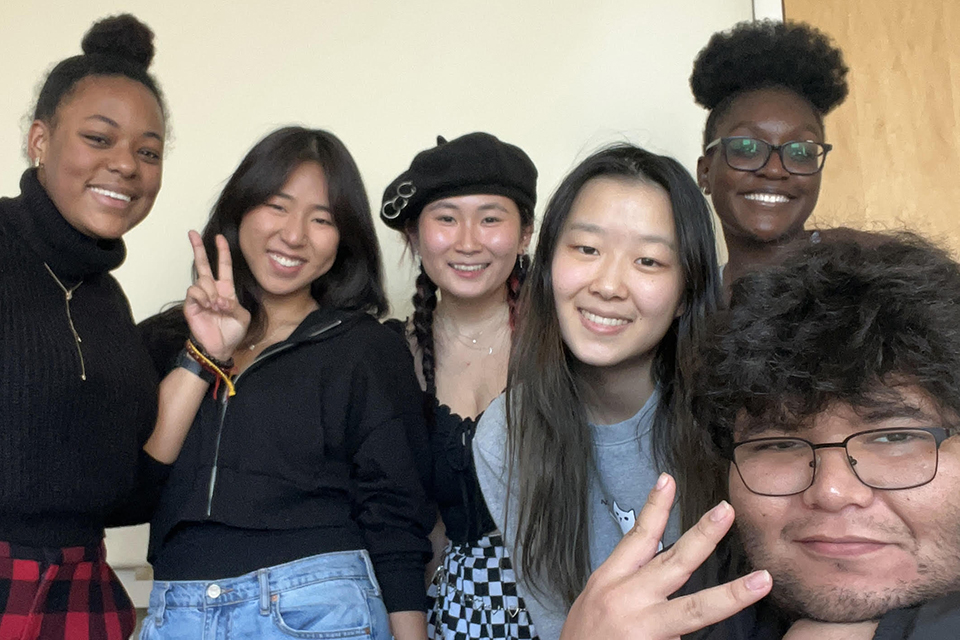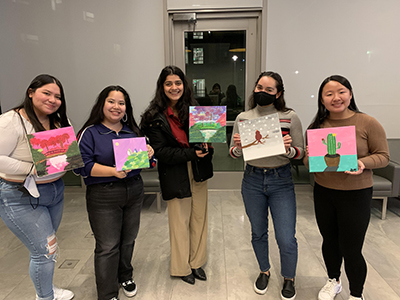From Gen One to each other: Five tips for First-Generation students
In celebration of First Generation Student Day on November 8th, five first generation students share their tips for the first-year experience.
 Photo/Rebecah Kennedy
Photo/Rebecah KennedyMembers of the Generation One board pose for a photo. Left to right: Rebecah Kennedy, Ngawang Tridytsang, Yuyao Shi, Mia Park, Justine Sarkodie, and Marco Ferral Hernandez
When Srishti Nautiyal ’23 transferred to Brandeis as a sophomore from Dehradun, India, it took time for her to adjust to classwork, a new campus schedule, and making new friends in a new country.
“I found myself struggling in the first few weeks to adjust to things like pop culture, which I learned is a huge part of how friendships begin. Coming from a different culture I didn’t have the same exposure as my peers,” said Nautiyal.
Then, she found Generation One. Often called ‘Gen One,’ the academic services program ensures students who are the first in their family to attend college aren’t alone when embarking on their Brandeis experience.
According to the Office of Institutional Research, first generation students made up 16 percent of the undergraduate population at Brandeis in 2021. Generation One aims to bring together this community of students who identify as first generation, low income, or children of immigrants, offering them a place to find supportive peers, educational resources, and academic support.
Each year a student board is elected to plan events and coordinate with members of the group. Five members of the student-run board share their first generation experience at Brandeis and tips for the first-year experience.
Tip One: Embrace your differences and make your own path.
Nautiyal became familiar with Generation One as a first-year on campus, when she was accepted with open arms and celebrated for her different experiences.
“There’s this feeling of humility and respect in the Gen One spaces,” she said. “Everyone knows what it’s like to have a different background, so you can feel people listening and really taking the time to understand one another.”
While the academic and advising support provided by Generation One is crucial, the feeling of belonging is just as valuable, she said.
“The experiences from my childhood and culture might be different from others, but they still deserve to be heard,” Nautiyal said. “Gen One gave me the confidence that my experiences mattered.”
In adjusting to campus life, Nautiyal recommends first generation students take the pressure off their academic performance.
“Being the first person in your family to go to college can come with a lot of pressure from friends, family, and other peers,” said Nautiyal. “Take it easy on yourself. Drop that fifth class if it isn’t working for you. It doesn’t reflect on your capabilities and potential for success at Brandeis.”

Members of Generation One pose with their painting creations. Left to right: Liliana Perez Diaz, Amanda Lui, Srishti Nautiyal, Gabriela Mendoza ‘22, and Kristi Ho ‘22
Tip Two: Take advantage of community resources.
Amanda Lui ’23, a psychology and Health, Science, Society, and Policy major, leaned on Generation One for support in navigating her first-year experience. The San Francisco native was the first in her family to attend college.
“Like many other first generation students, I came to college not really knowing what to expect,” said Lui. “Finding Generation One really helped me excel in my college experience.”
Lui shared her appreciation for the diners and cafes, held every other week on campus. In addition to a comfortable space, good music, and delicious food ordered from businesses throughout the Waltham area, each dinner features an informative presentation from faculty and staff across campus.
Past presentations have included how to apply for financial aid, highlighting accessibility on campus, and information about paid community service opportunities. Students leave each gathering with resource contact information and new campus connections.
“The dinners have really expanded my inner circle,” Lui said.“I applied for a job within the financial aid office after their information session. I’ve been working there ever since.”
For first generation students who aren’t sure where to start when they arrive on campus, Lui suggests the best thing they can do is find ways to get involved.
“Don’t be afraid to speak up,” she said. “People on campus will be there to help with whatever you ask for. If you see someone who might be friendly, odds are they probably are — especially at Brandeis.”
Tip Three: Find the courage to make an impact.
Rebecah Kennedy ‘22, MBA ’23, discovered the program during her first year on campus.
“Coming from South Florida and being a child of immigrants, Generation One was the first place on campus that I felt like I found a community,” said Kennedy.
Through Generation One she felt encouraged to pursue different academic opportunities while becoming a leader within the group. “I worked with academic services to form my path on campus and in the classroom. I was given the tools to be the best I could be at Brandeis.”
Kennedy completed her undergraduate degree with three majors in history, African and African American studies, and business. She’s now pursuing her master’s of international economics and finance through the International Business School.
When Kennedy joined as a first-year student, Generation One only met twice a month for dinners. During her time as an undergraduate she assisted the group in the creation of new annual events, such as a “Friendsgiving” celebration for those who don’t return home for Thanksgiving. Now, as a graduate student, Kennedy continues to work alongside the group.
As National First-Generation Day approaches on November 8th, the group is planning a week-long celebration across campus. Some events will include a gala themed reception, movie night, and a trip to a summit held at MIT on November 5th. Three Brandeis first-generation students, including Kennedy, will be speaking at the reception.
Kennedy encourages first generation students to have the courage to ask for advice.
“Don’t be afraid to ask for help, advice, and resources. It can be hard to navigate everything. No question is a dumb question. If someone doesn’t know the answer they’ll just direct you to someone who does.”
Tip Four: Develop a network on campus.
Mia Park ’23, an international student from Sydney, Australia, transferred to Brandeis from a community college in Holyoke, Massachusetts in pursuit of an interdisciplinary program that focused on both politics and international studies. After discovering Generation One on Instagram during her first semester on campus, the international global studies major found herself drawn to the group.
Park explained that while the group finds support among faculty and staff, they also look out for each other. “Our biggest goal is to bring visibility to the first-generation community of students on campus. To do this we each use our own connections to bring something to the table,” said Park. “The whole point of the program is to network. We network amongst the groups and bring resources to share with each other. We work quite effectively as a team.”
Park’s advice for incoming first generation students? Make yourself at home on campus.
“Try to find your place to dig in and form your roots,” said Park. “You never know which will grow into something bigger. Brandeis is full of opportunities to meet new people and take chances.”
Tip Five: Lean on the support of mentors.
For Justine Sarkodie ’25, a biology and Health, Science, Society, and Policy major, Generation One showed her the value of mentorship. After joining the group, she was surprised to see how supported the first generation community was on campus.
“I was so surprised to see my math professor at the first meeting I attended,” said Sarkodie, referring to associate professor Keith Merril. “It was so heartwarming to see that despite all they have on their plate, professors were showing up to meet with students outside the classroom.”
Many faculty members and staff, some having been first-generation students themselves, attend the diners regularly. They find the group provides a casual environment to get to know the students better while providing them with support in their college experience.
“Lisa Rourke, assistant professor of university writing, attends dinners and cafe meetings to get to know students across campus.
“Students appreciate the faculty and staff attending the gatherings,” said Lisa Rourke, assistant professor of university writing. “It gives students the chance to build stronger relationships with these campus mentors.”
Because of the support system she found among Generation One, Sarkodie felt inspired to help her fellow classmates.
“Being in Gen One made me want to become a mentor to other first-generation students,” said Sarkodie. “Especially for STEM students. It’s so important to have people to share resources and advice to keep you going when things get challenging.”
She recommends first generation students seek out peer mentors with similar experiences, both off and on campus. As a first-year and sophomore, she found having an upperclassman student mentor with the same majors helped her map out her classes for the rest of her program.
“You can never have too many mentors,” she said. “Having connections I can trust across campus, including students and professors, has helped me get a better sense of how to shape my Brandeis experience.”
Categories: General, Student Life





